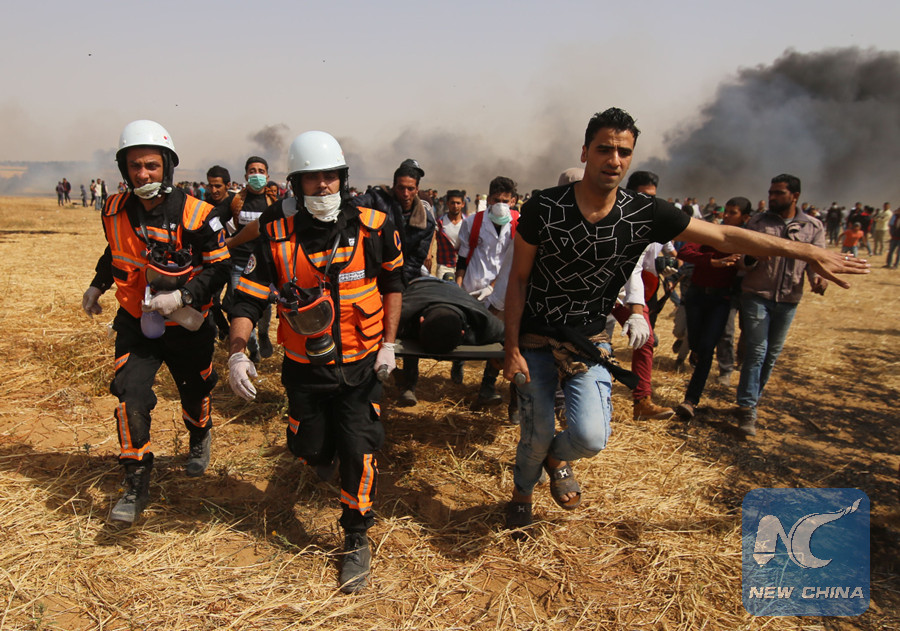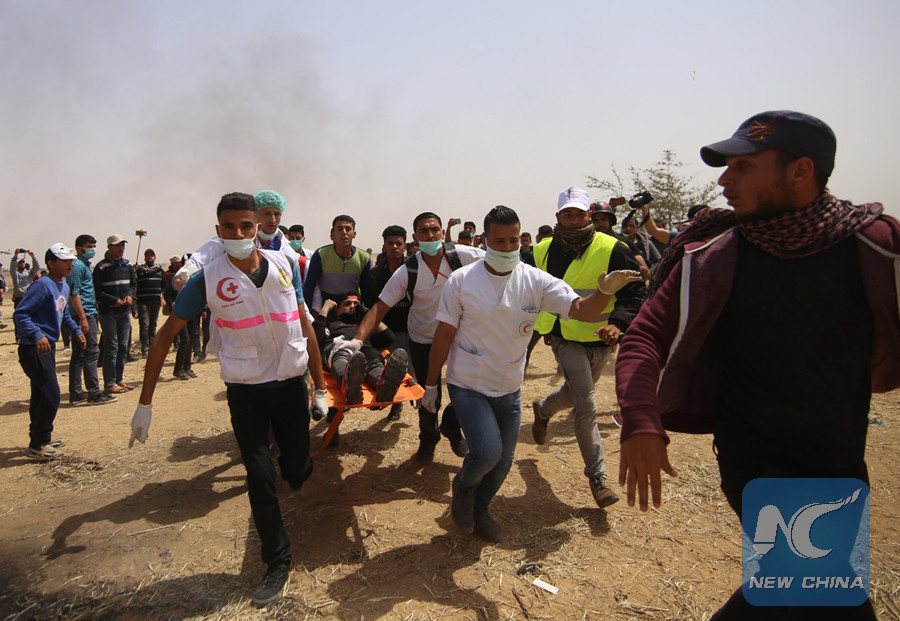
Palestinian medics carry an injured protestor during clashes with Israeli troops on the Gaza-Israel border, east of Khan Younis in southern Gaza Strip on April 13, 2018. (Xinhua/Khaled Omar)
GAZA, April 13 (Xinhua) -- As soon as they heard the whizz of Israeli gunshots, paramedics and medics ran quickly to rescue the lives of Palestinian protestors, who got injured by Israeli troops' gunfire during the clashes near the border between eastern Gaza Strip and Israel.
These medical staff are always on the frontline whenever there are violent conflicts between Palestinians and Israeli army.
Although they could be easily identified as medical team staff in their professional uniform, they still faced Israeli army's gunfire and tear gas during the protests on Gaza border which started in March 30 and will end on May 15.
On Friday, several tear canisters, fired by Israeli soldiers, hit a tent that was turned into a medical clinic to treat the injured protesters.
A total of 14 paramedics inhaled the tear gas. Some of them were hospitalized while others got back to work after receiving treatment.
One of these injured paramedics was 29-year-old Ibrahim Islayyeh. "I fainted after I inhaled the tear gas, but now I feel better. I came back to work and I'm so happy for doing this job," he said.
At Nasser Hospital in central Khan Yunis in southern Gaza Strip, paramedic Hamdan Madi told his visitors the moments before he was hit by two bullets in the right leg.
He worked as a field medic during the Gaza rally and used orange stretcher to transport the wounded from the clash scene.
"I pulled out more than nine wounded and offered their first medical aid. When I was going to carry another injured, two bullets hit my feet," said Madi.
Ashraf al-Qudra, spokesman of Gaza's Health Ministry, accused Israeli army of using weapons he said were "internationally banned" in suppressing demonstrators and paramedics, as well as deliberately targeting Palestinian ambulances.

Palestinian medics carry an injured protestor during clashes with Israeli troops on the Gaza-Israel border, east of Khan Younis in southern Gaza Strip on April 13, 2018. (Xinhua/Khaled Omar)
Al-Qudra told Xinhua that 21 paramedics had been wounded by Israeli army's gunfire and dozens injured from tear gas near the Gaza border since the outbreak of the protests.
As part of the six-week rallies called the Great March of Return, which started in March 30 and will end on May 15, the Palestinians held five rallies in eastern Gaza Strip along with the border with Israel to demonstrate.
In these five gatherings medical staff were deployed to provide medical assistance and care to the wounded protestors.
"Their work is risk-based but they still keep carrying out their humanitarian mission," said Hakim Nihad Othman, who founded a volunteer medical team to treat the injured Palestinian protestors east of Rafah in southern Gaza Strip.
He told Xinhua that the most difficult moments of their work were when they faced big risks to run to rescue victims who fell on the floor after being shot only a few meters far from the border fence.
Thousands of Palestinians in Gaza have launched the protest, which demands Israel to acknowledge Palestinian refugees' right to return to their lands before the 1948 war, known also as Israel's Independence War.
The protests are expected to culminate next month, when Israel will mark its 70th Independence Day and the Palestinians will commemorate the Nakba Day, or "Day of the Catastrophe."
Dozens of Palestinians were killed by Israeli military gunfire and thousands were injured during the weekend marches towards the fence.
Wissam Eid, a 23-year-old graduate from the Faculty of Nursing, just joined the third Friday demonstrations.
For Eid, who is from Rafah refugee camp that is close to the border with Egypt, working in a medical team in such circumstances is a useful experience for her career.

